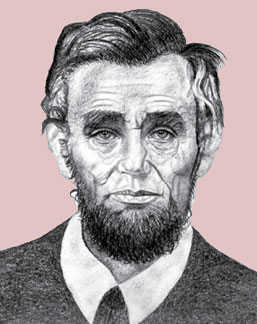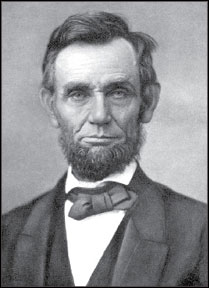|

When Darwin was busy theorizing
about natural selection, good old Abe was busy formulating the
Emancipation Proclamation. It seems a marvelous coincidence that two of
the historically most important people were born the same year, same
month and same date.
February 12th we commemorate the 200th birth anniversary of both
Charles Darwin and Abraham Lincoln. But perhaps talking about good old
Abe - christened `the great emancipator’ - is more appropriate with US’s
first African American president now in power.
 He
had a rough childhood owing to debt, loss of his mother, Nancy Hanks,
and an estranged father, Thomas Lincoln. At 6 foot 4 inches (1.93 m), he
was unusually tall and strong. He
had a rough childhood owing to debt, loss of his mother, Nancy Hanks,
and an estranged father, Thomas Lincoln. At 6 foot 4 inches (1.93 m), he
was unusually tall and strong.
He was a talented wrestler and skilled with the axe, but prevented
from hunting at all cost because it was said that he detested killing
animals even for food.
Although his education was limited to just 18 months, he was an avid
reader and self-educated. It is believed that he got his captivating
ability of eloquent speech through mimicking his father at a very young
age.
By 1841 he had already entered politics and was a successful lawyer.
He served four successive terms in the Illinois House of Representatives
as a representative from Sangamon County, and became a leader of the
Illinois Whig party. In 1837 he made his first protest against slavery
in the Illinois House.
In 1846 Lincoln was elected to one term in the U.S. House of
Representatives. Even as a freshman House member who didn’t have much
say in what happened in congress, Lincoln was passionately anti war,
clear through his stand on US’s war with Mexico at the time.
At the end of his term in the House, declining governorship in Oregon
Territory, he tried to make a living with law.
It was during this time that he made one of the most pivotal
speeches. On October 16, 1854, arguing the moral, political and economic
unfeasibility of slavery, that he was to uphold for the rest of his
life, Lincoln spoke to a crowd in Peoria, Illinois.
This marked his re-entry into public life. He was instrumental in
forming the new Republican Party. At the Republican convention in 1856,
Lincoln placed second in the contest to become the party’s candidate for
Vice-President.
Accepting a Republican nomination for Senate in 1858, Lincoln
delivered yet another of his famous speeches: ‘A house divided against
itself cannot stand...’
Although he lost a seat in the senate, in the contest with Douglas,
his speeches made him a political star. Lincoln was emerging as the
intellectual leader of the Republican Party, and its best speaker.
Lincoln was chosen as the Republican candidate for the 1860 election,
because of his moderate views on slavery. At the Illinois Republican
State Convention, held in Decatur, Lincoln received his first
endorsement to run for the presidency.
The American civil war broke out in 1861.
On November 6, 1860, Lincoln was elected as the 16th President of the
United States and won in a landslide in the re-elections of 1864. He
successfully put an end to slavery while leading the USA through a tough
time of civil war. Unfortunately the end of the war also brought his
death. He was assassinated.
Abraham Lincoln died on April 15, 1865. His tenure in office was
occupied primarily with the defeat of the secessionist Confederate
States of America in the American Civil War. He introduced measures that
resulted in the abolition of slavery, issuing his Emancipation
Proclamation in 1863 and promoting the passage of the Thirteenth
Amendment to the Constitution.
It was clear, that through reviewing his war efforts, that he
possessed great political insight, considering the way he handled the
factions of the Republican Party, bringing leaders, Ulysses S. Grant as
generals, of each faction into his cabinet and forcing them to
cooperate.
Despite harsh criticism leveled at him for moving too slow in
abolishing slavery, he rallied public opinion on the subject through
rhetoric and speeches. His assassination was the first presidential
assassination in U.S. history, turning him into a martyr for the ideal
of national unity and human rights.
But in the light of what had recently happened in the oval office
(the first US African American president coming into power) a whole new
debate about good old Abe has emerged. President Obama glorifies Lincoln
and some even liken him to Lincoln as a savior of the country.
Most said that Lincoln would have been overjoyed; however, some argue
that he would have been appalled, quoting Lincoln “there is a physical
difference between the white and black races, which ... will forever
forbid the two races living together upon terms of social and political
equality.’’
And some even argue that the Emancipation Proclamation was merely a
political move and that it still did not give him any authority to free
slaves in Confederate states.
Critics claim that Lincoln has publicly said in his debates with
Douglas that restricting further spread of slavery into the western
territories and new states would, in fact, reduce the possibility of
race mixing. But Lincoln diehards say that this separation is better
than deporting the blacks to their native land.
Whatever he was, we have to hand it to him, good old Abe sure did
make his mark in history. - Sajitha
By 1841 he had already entered politics and was a successful lawyer.
He served four successive terms in the Illinois House of Representatives
as a representative from Sangamon County, and became a leader of the
Illinois Whig party.
In 1837 he made his first protest against slavery in the Illinois
House. In 1846 Lincoln was elected to one term in the U.S. House of
Representatives.
Even as a freshman House member who didn’t have much say in what
happened in congress, Lincoln was passionately anti war, clear through
his stand on US’s war with Mexico at the time. At the end of his term in
the House, declining governorship in Oregon Territory, he tried to make
a living with law.
It was during this time that he made one of the most pivotal
speeches. On October 16, 1854, arguing the moral, political and economic
unfeasibility of slavery, that he was to uphold for the rest of his
life, Lincoln spoke to a crowd in Peoria, Illinois. This marked his
re-entry into public life.
He was instrumental in forming the new Republican Party. At the
Republican convention in 1856, Lincoln placed second in the contest to
become the party’s candidate for Vice-President. Accepting a Republican
nomination for Senate in 1858, Lincoln delivered yet another of his
famous speeches: ‘A house divided against itself cannot stand...’
Although he lost a seat in the senate, in the contest with Douglas,
his speeches made him a political star. Lincoln was emerging as the
intellectual leader of the Republican Party, and its best speaker.
Lincoln was chosen as the Republican candidate for the 1860 election,
because of his moderate views on slavery. At the Illinois Republican
State Convention, held in Decatur, Lincoln received his first
endorsement to run for the presidency.
The American civil war broke out in 1861.
On November 6, 1860, Lincoln was elected as the 16th President of the
United States and won in a landslide in the re-elections of 1864. He
successfully put an end to slavery while leading the USA through a tough
time of civil war. Unfortunately the end of the war also brought his
death. He was assassinated.
Abraham Lincoln died on April 15, 1865. His tenure in office was
occupied primarily with the defeat of the secessionist Confederate
States of America in the American Civil War. He introduced measures that
resulted in the abolition of slavery, issuing his Emancipation
Proclamation in 1863 and promoting the passage of the Thirteenth
Amendment to the Constitution.
 It
was clear, that through reviewing his war efforts, that he possessed
great political insight, considering the way he handled the factions of
the Republican Party, bringing leaders, Ulysses S. Grant as generals, of
each faction into his cabinet and forcing them to cooperate. It
was clear, that through reviewing his war efforts, that he possessed
great political insight, considering the way he handled the factions of
the Republican Party, bringing leaders, Ulysses S. Grant as generals, of
each faction into his cabinet and forcing them to cooperate.
Despite harsh criticism leveled at him for moving too slow in
abolishing slavery, he rallied public opinion on the subject through
rhetoric and speeches. His assassination was the first presidential
assassination in U.S. history, turning him into a martyr for the ideal
of national unity and human rights.
But in the light of what had recently happened in the oval office
(the first US African American president coming into power) a whole new
debate about good old Abe has emerged. President Obama glorifies Lincoln
and some even liken him to Lincoln as a savior of the country.
Most said that Lincoln would have been overjoyed; however, some argue
that he would have been appalled, quoting Lincoln “there is a physical
difference between the white and black races, which ... will forever
forbid the two races living together upon terms of social and political
equality.’’
And some even argue that the Emancipation Proclamation was merely a
political move and that it still did not give him any authority to free
slaves in Confederate states.
Critics claim that Lincoln has publicly said in his debates with
Douglas that restricting further spread of slavery into the western
territories and new states would, in fact, reduce the possibility of
race mixing. But Lincoln diehards say that this separation is better
than deporting the blacks to their native land.
Whatever he was, we have to hand it to him, good old Abe sure did
make his mark in history.
- Sajitha
|


